仁爱版英语九年级上Unit 1The Changing World Topic1 Section D 课件+嵌入音视频(35张PPT)
文档属性
| 名称 | 仁爱版英语九年级上Unit 1The Changing World Topic1 Section D 课件+嵌入音视频(35张PPT) | 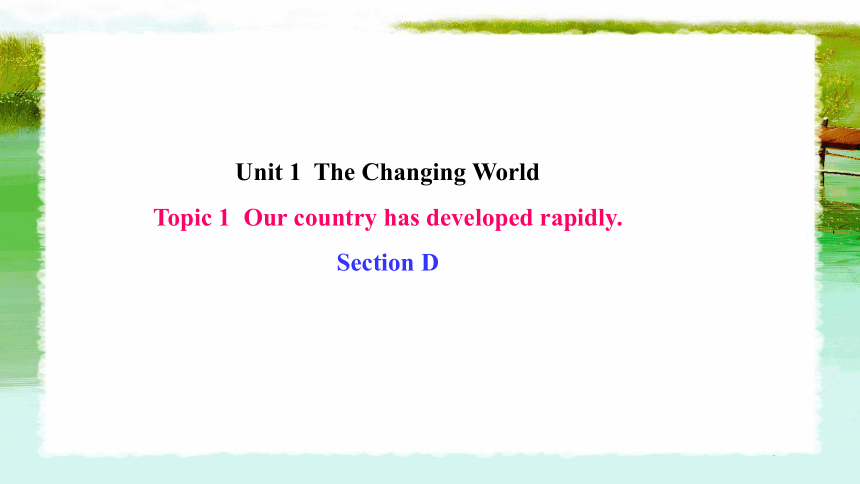 | |
| 格式 | zip | ||
| 文件大小 | 4.8MB | ||
| 资源类型 | 教案 | ||
| 版本资源 | 仁爱科普版 | ||
| 科目 | 英语 | ||
| 更新时间 | 2020-12-09 14:09:12 | ||
图片预览

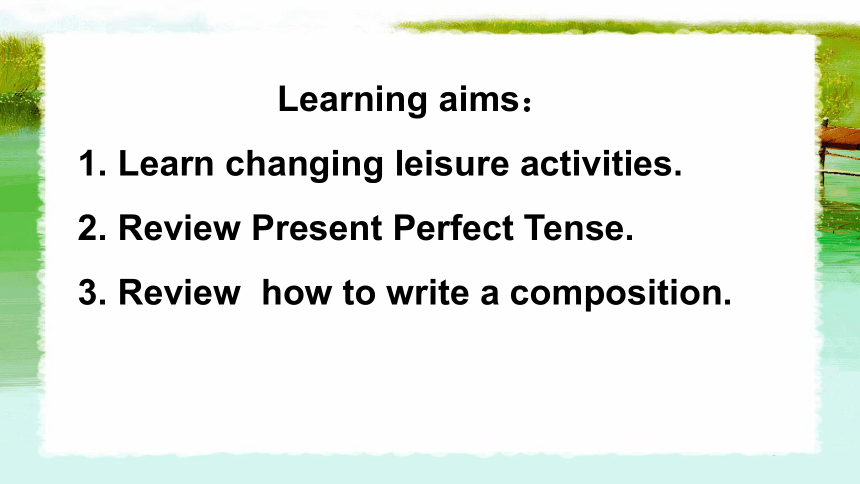
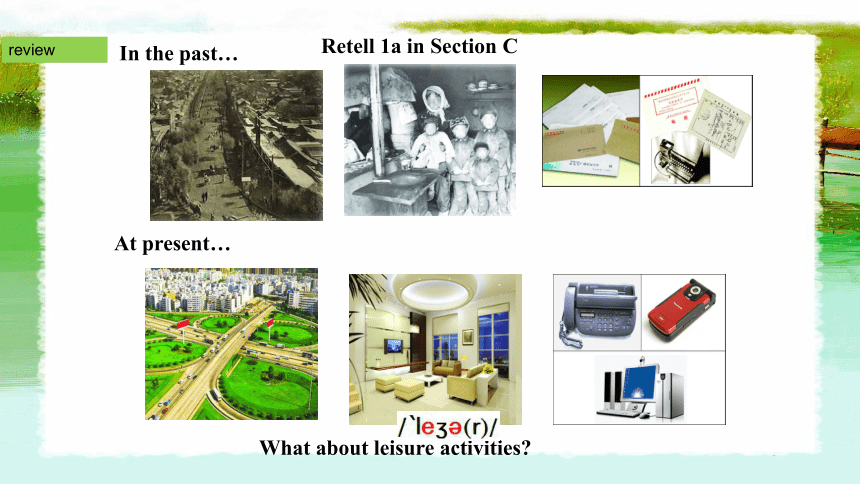
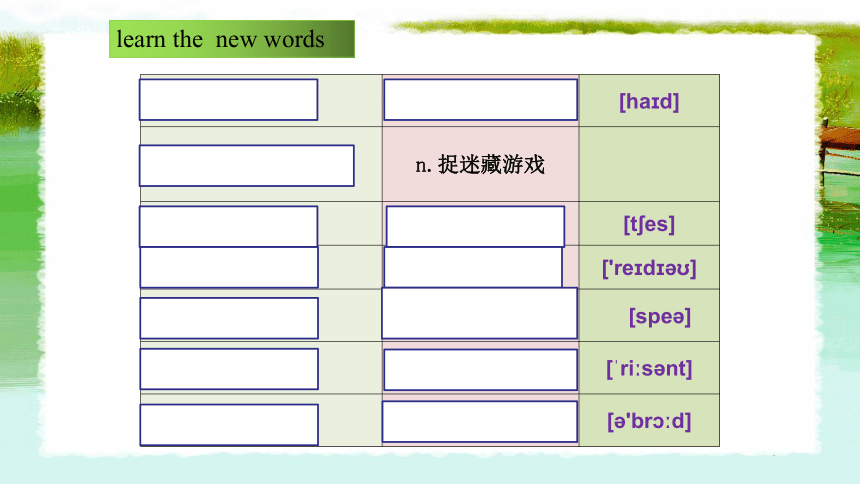
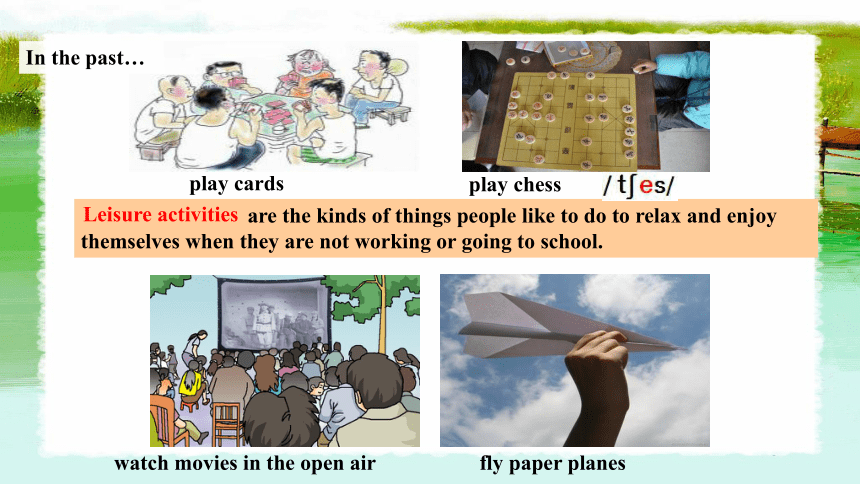
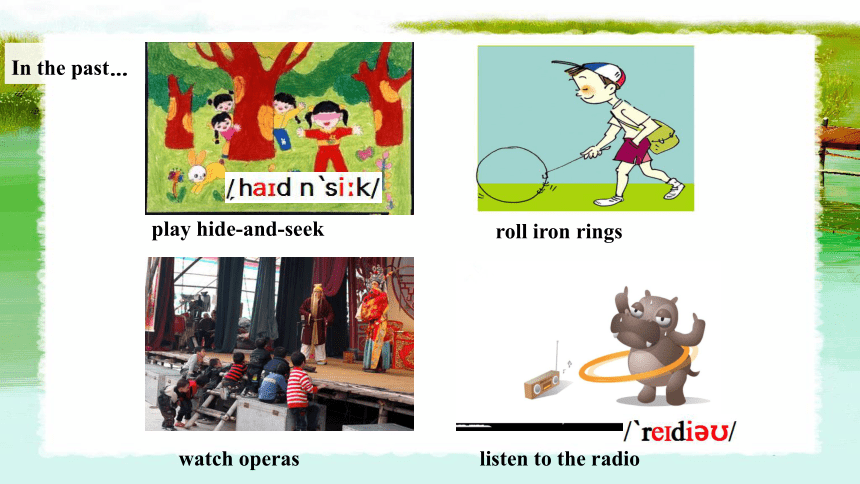
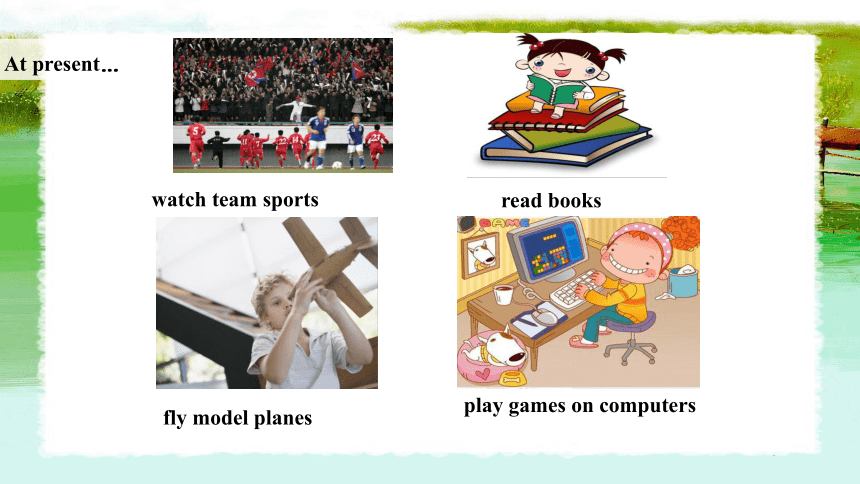
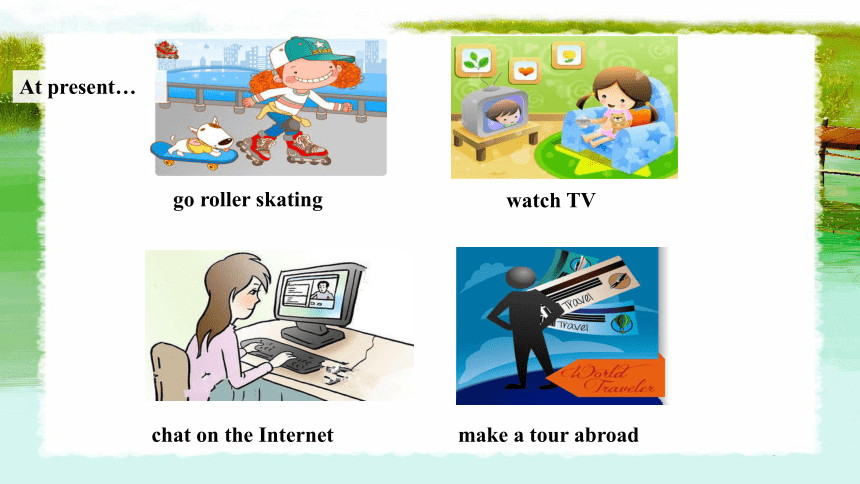
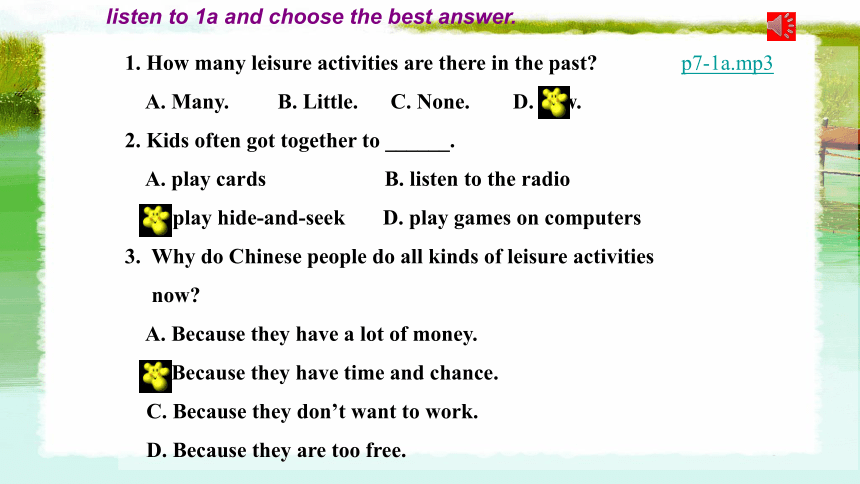
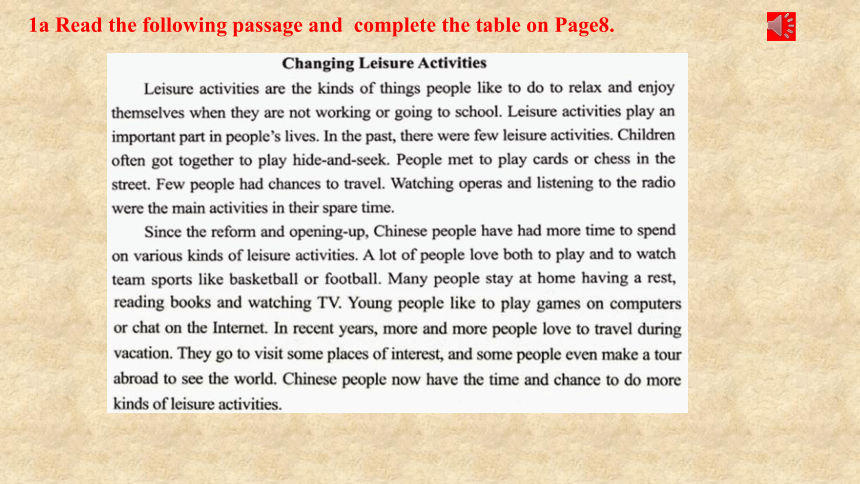
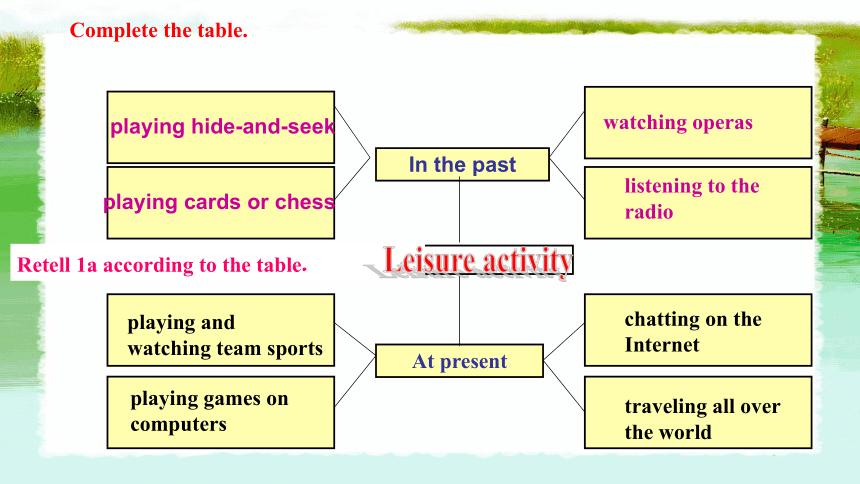
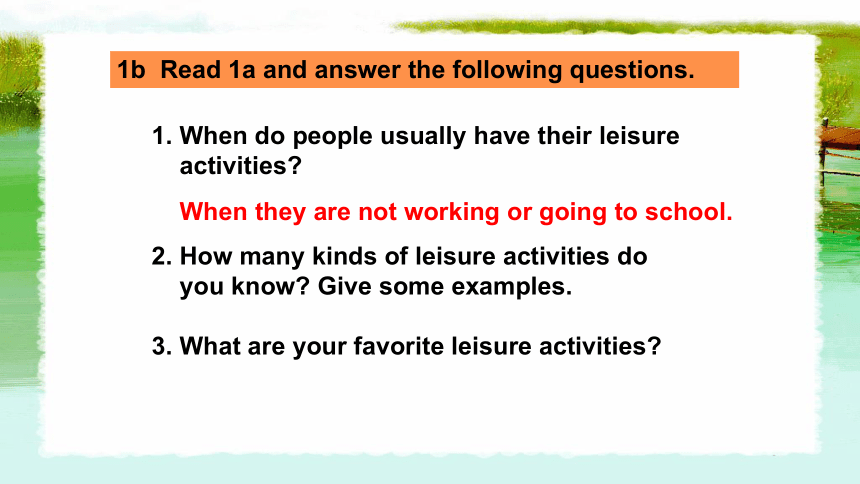
文档简介
(共35张PPT)
Unit
1
The
Changing
World
Topic
1
Our
country
has
developed
rapidly.
Section
D
Learning
aims:
1.
Learn
changing
leisure
activities.
2.
Review
Present
Perfect
Tense.
3.
Review
how
to
write
a
composition.
Retell
1a
in
Section
C
In
the
past…
At
present…
What
about
leisure
activities?
review
hide
v.躲藏;遮挡;隐瞒
[ha?d]
hide
and
seek
n.捉迷藏游戏
chess
n.国际象棋
[t?es]
radio
n.收音机
['re?d???]
spare
adj.空闲的;空余的
=free
[spe?]
recent
adj.近来的,最近的
[?ri?s?nt]
abroad
adv.在国外;到国外
[?'br??d]
learn
the
new
words
play
cards
play
chess
watch
movies
in
the
open
air
fly
paper
planes
In
the
past…
are
the
kinds
of
things
people
like
to
do
to
relax
and
enjoy
themselves
when
they
are
not
working
or
going
to
school.
Leisure
activities
play
hide-and-seek
roll
iron
rings
watch
operas
listen
to
the
radio
In
the
past…
watch
team
sports
read
books
fly
model
planes
play
games
on
computers
At
present…
go
roller
skating
watch
TV
chat
on
the
Internet
make
a
tour
abroad
At
present…
listen
to
1a
and
choose
the
best
answer.
1.
How
many
leisure
activities
are
there
in
the
past?
A.
Many.
B.
Little.
C.
None.
D.
Few.
2.
Kids
often
got
together
to
______.
A.
play
cards
B.
listen
to
the
radio
C.
play
hide-and-seek
D.
play
games
on
computers
3.
Why
do
Chinese
people
do
all
kinds
of
leisure
activities
now?
A.
Because
they
have
a
lot
of
money.
B.
Because
they
have
time
and
chance.
C.
Because
they
don’t
want
to
work.
D.
Because
they
are
too
free.
p7-1a.mp3
1a
Read
the
following
passage
and
complete
the
table
on
Page8.
In
the
past
At
present
Complete
the
table.
playing
hide-and-seek
watching
operas
playing
cards
or
chess
listening
to
the
radio
playing
and
watching
team
sports
playing
games
on
computers
chatting
on
the
Internet
traveling
all
over
the
world
Retell
1a
according
to
the
table.
Leisure
activity
1b
Read
1a
and
answer
the
following
questions.
1.
When
do
people
usually
have
their
leisure
activities?
2.
How
many
kinds
of
leisure
activities
do
you
know?
Give
some
examples.
3.
What
are
your
favorite
leisure
activities?
When
they
are
not
working
or
going
to
school.
1.
Leisure
activities
play
an
important
part
in
people’s
lives.
休闲活动在人们的生活中起着重要的作用。
play
a/an…
part
=
play
a/an…
role
扮演……角色;起……作用;有……影响
e.g.
Computer
plays
an
important
part
in
our
daily
lives.
lives
life---
lives
n.
生活,生命
live---
lives
v.
居住,生活
Language
points
Language
points
2.
Watching
operas
and
listening
to
the
radio
were
the
main
activities
in
their
spare
time.
看戏和听广播是他们在空闲时间的主要活动。
watching
operas
and
listening
to
the
radio
是动名词短语,作这个句子的主语。
e.g.
Reading
books
plays
an
important
part
in
his
life.
e.g.
She
often
goes
shopping
in
her
spare
time.
in
one’s
spare/free
time
在某人的业余时间
Language
points
3.
They
go
to
visit
some
places
of
interest,
and
some
people
even
make
a
tour
abroad
to
see
the
world.
他们去参观名胜古迹,有些人甚至去国外旅游。
make
a
tour
abroad
去国外旅游
e.g.
They
plan
to
make
a
tour
abroad
next
year.
abroad
adv.
在国外,到国外
go
abroad
去国外
at
home
and
abroad
国内外
be
abroad
在国外
4.Chinese
people
have
had
more
time
to
spend
on
various
kinds
of
activities
.
翻译:
点拨:spend
some
time
/money
on
sth
/
(in)
doing
sth
.
“花费时间/金钱做某事”
练习:
They
spent
two
hours
__________(种植)trees
in
the
park
yesterday
.
中国人有更多的时间花在各种各样的休闲活动上。
planting
5.
A
lot
of
people
love
both
to
play
and
to
watch
team
sports
like
basketball
or
football
.
点拨:both…
and
…
……和…..都
注意:both…
and
…连接两个主语时,谓语动词用复数;not
only
…
but
also…应遵循就近原则
练习:用be填空
(1)Both
Lucy
and
Lily
________at
home
now
.
(2)Not
only
Kate
but
also
I
_____
happy
to
see
each
other
yesterday.
are
was
Functions
=
I
had
no
time
to
travel,
but
I
still
felt
very
happy.
=
How
wonderful
the
experience
is!
=That’s
the
bell.
=
The
bell
is
ringing.
There
goes
the
bell.
What
a
wonderful
experience!
Though
I
had
no
time
to
travel,
I
still
felt
very
happy.
To
help
others
makes
us
happy.
I
think
it
is
important
to
remember
the
past,
live
in
the
present
and
dream
about
the
future.
make
sb./sth.
+
adj.
make
sb./sth.
do
sth.
Read
through
Sections
A-C
and
understand
the
underlined
parts.
Useful
expressions
_____
was
your
trip?
I’ve
_________
a
lot
__________
it.
Though
I
had
no
time
___________,
I
still
felt
very
happy.
People
________________
their
friends
and
relatives
__________
mainly
by
letter
or
telegram.
Beijing
has
made
rapid
progress
and
it
has
already
_____________
hosting
the
2008
Olympic
Games.
There
are
kinds
of
food
and
clothes
to
____________
_______.
短语回顾,原句再现
How
learnt
from
to
travel
kept
in
touch
with
far
away
succeeded
in
satisfy
people’s
needs
I
have
been
to
Mount
Huang
with
my
parents.
She
has
gone
to
Cuba
to
be
a
volunteer.
China
has
developed
rapidly
since
the
reform
and
opening-up.
It
has
already
succeeded
in
hosting
the
2008
Olympic
Games.
Great
changes
have
taken
place
there…
I
haven’t
seen
you
for
a
long
time.
Have
you
been
to
any
other
place?
Yes,
I
have./
No,
I
haven’t.
Present
Perfect
(Ⅰ)
Grammar
Present
Perfect
(I)
用法1:表示过去已经发生或已经完成的某一动作对现在造成的影响或结果。即“过去的动作
+
现在的结果”,强调结果。
用法2:过去已经开始,持续到现在的动作或者状态
I
have
studied
English
for
five
years.
构成:助动词have/has
+
动词的过去分词
(1)
肯定句:主语+have/has
+过去分词+其它
e.g.
We
have
seen
the
film.
(2)
否定句:主语+haven’t/hasn’t
+过去分词+其它。
e.g.
We
haven’t
seen
the
film.
(3)
一般疑问句:Have/Has
+主语
+过去分词+其它?
e.g.
Have
you
seen
the
film?
特殊疑问句:
特殊疑问句:
构成形式:
助动词have
/
has
+
动词的过去分词
肯定句:
否定句:
一般疑问句:
回答:
是的,我看过了。
不,我没看过。
1,
2.
肯定句:
否定句:
一般疑问句:
回答:
我已经看过这部电影。
I
have
seen
the
film.
I
haven’t
seen
the
film.
我没看过这部电影。
Have
you
seen
the
film?
你看过这部电影了吗?
Yes,
I
have.
No,
I
haven’t.
What
have
you
done?
你已经做了什么?
He
has
finished
the
task.
他已经完成了任务。
He
hasn’t
finished
the
task.
他还没有完成任务。
Has
he
finished
the
task?
他已经完成任务了吗?
Yes,
he
has.
是的,他完成了。
No,
he
hasn’t.
不,他没有完成。
What
has
he
finished?
他完成了什么?
have/
has
been
to与
have/
has
gone
to和have/has
been
in
火眼金睛
例:
(1)I
have
been
to
Xiamen
twice.
我去过厦门两次。
(2)---
Where
is
Jim?
吉姆在哪儿?
---
He
has
gone
to
the
library?
他去图书馆了。
(3)Esther
has
been
in
Beijing
for
4
years.
have/
has
been
to
+
某地,
曾经去过某地(可以和次数连用)
have
/has
gone
to
+
某地,
已经去了某地(不和一段时间或次数连用)
have
/has
been
in
与一段时间连用,表示呆在某地多长时间
Project
Making
a
Poster
About
Changing
Leisure
Activities
1.
Leisure
activities
for
children
have
changed
a
lot.
Look
at
the
table
below
and
talk
about
them
in
groups.
2.
Try
to
find
out
more
changes
in
leisure
activities
and
their
pictures.
You
can
ask
your
parents
or
grandparents
for
help
if
necessary.
3.
Make
a
poster
to
show
the
changes
with
the
topic
Different
Times,
Different
Leisure
Activities.
Choose
the
best
one
in
each
group
and
display
it
on
the
wall.
In
the
past
Now
watch
movies
in
the
open
air
fly
paper
planes
roll
iron
rings
…
watch
movies
at
home
fly
model
planes
go
roller
skating
…
PROJECT
How
to
write
a
composition.
Example:
Look
at
the
pictures.
Then
discuss
the
changes
which
have
taken
place
in
Li
Ming’s
hometown.
Write
a
composition
with
the
help
of
the
notes
and
outline.
First,consider
it
carefully.
live
in
a
low
house
live
in
a
tall
building
plant
crops
with
the
help
of
farm
animals
plant
crops
with
the
help
of
farm
machines
study
in
an
old
school
study
in
a
modern
school
Example:
Outline
Title:
Changes
in
Li
Ming’s
Hometown
Body:
a.
Changes
in
living
conditions
b.
Changes
in
working
tools
C.
Changes
in
education
...
Conclusion:
Thanks
to
the
government’s
efforts,
Li
Ming’s
hometown
is
becoming
better
and
better.
Next,
draw
up
an
outline.
Then,
write
the
composition.
Finally,
check
over
the
composition.
Changes
in
Li
Ming’s
Hometown
Great
changes
have
taken
place
in
Li
Ming’s
hometown
since
the
reform
and
opening-up.
In
the
past,
people
lived
in
low
houses.
The
farmers
planted
crops
only
with
the
help
of
farm
animals.
Children
studied
in
old
schools.
But
now,
most
people
live
in
tall
buildings.
The
farmers
can
plant
crops
with
the
help
of
farm
machines.
And
children
study
in
modern
schools.
Thanks
to
the
government’s
efforts,
Li
Ming’s
hometown
is
becoming
better
and
better.
One
possible
version:
Choose
the
best
answer.
1.
—The
farmers
in
our
village?
have?
been?
to?
the?
USA.
—Really
?
When
______
there?
A.
will?
they?
go
B.
did?
they?
go
C.
do?
they?
go
D.
have?
they?
gone
2.
We
now
______
him
by
writing
letters.
A.
keep
away
from
B.
keep
on
C.
keep
distance
D.
keep
in
touch
with
3.
Breakfast
______
an
important
part
in
our
meals.
A.
goes
B.
have
C.
plays
D.
get
4.
Miss?
Green?
isn’t?
in?
the?
office
.
She
______
to?the
library.
A.
has?
gone
B.
went
C.will?
go
D.?
has?
been
Exercises
Let’s
do
1.
They
often
play
games
_______________________(户外).
2.
Computers
________________________(在……中起着重要的作用)
people’s
lives.
3.
______________(在过去),few
people
have
chances
to
travel.
4.
Though
I
_________________(没时间)
to
practice
singing,
I
still
have
my
dream.
5.
Most
of
the
students
like
watching
TV
______________________(在他们的空闲时间里).
6.
I
want
to
travel
___________(到国外)
when
I
have
enough
time.
7.
I
usually
________________(下国际象棋)
with
my
friends
after
school.
in
the
open
air
play
an
important
part
in
In
the
past
have
no
time
in
their
free/
spare
time
abroad
play
chess
summary
We
learn:
1.
Talk
about
the
changing
leisure
activities.
2.
Make
a
poster
and
review
ways
to
write
a
composition.
3.
Use
the
Present
Perfect
Tense.
We
can:
1.
Some
words:
leisure,
hide,
hide-and-seek,
chess,
radio,
spare,
recent,
abroad
2.
Some
phrases:
play
an
important
part
in,
play
hide-and-seek,
play
chess,
in
one’s
spare
time,
make
a
tour
abroad,
in
the
open
air,
roll
iron
rings
3.
Some
sentences:
Watching
operas
and
listening
to
the
radio
were
the
main
activities
in
their
spare
time.
Homework
3.
Make
a
poster
about
changing
leisure
activities.
1.
Read
1a
aloud.
2.
Finish
Section
D
in
your
workbook.
4.
Preview
Section
A
in
Topic
2.
THANK
YOU!
Unit
1
The
Changing
World
Topic
1
Our
country
has
developed
rapidly.
Section
D
Learning
aims:
1.
Learn
changing
leisure
activities.
2.
Review
Present
Perfect
Tense.
3.
Review
how
to
write
a
composition.
Retell
1a
in
Section
C
In
the
past…
At
present…
What
about
leisure
activities?
review
hide
v.躲藏;遮挡;隐瞒
[ha?d]
hide
and
seek
n.捉迷藏游戏
chess
n.国际象棋
[t?es]
radio
n.收音机
['re?d???]
spare
adj.空闲的;空余的
=free
[spe?]
recent
adj.近来的,最近的
[?ri?s?nt]
abroad
adv.在国外;到国外
[?'br??d]
learn
the
new
words
play
cards
play
chess
watch
movies
in
the
open
air
fly
paper
planes
In
the
past…
are
the
kinds
of
things
people
like
to
do
to
relax
and
enjoy
themselves
when
they
are
not
working
or
going
to
school.
Leisure
activities
play
hide-and-seek
roll
iron
rings
watch
operas
listen
to
the
radio
In
the
past…
watch
team
sports
read
books
fly
model
planes
play
games
on
computers
At
present…
go
roller
skating
watch
TV
chat
on
the
Internet
make
a
tour
abroad
At
present…
listen
to
1a
and
choose
the
best
answer.
1.
How
many
leisure
activities
are
there
in
the
past?
A.
Many.
B.
Little.
C.
None.
D.
Few.
2.
Kids
often
got
together
to
______.
A.
play
cards
B.
listen
to
the
radio
C.
play
hide-and-seek
D.
play
games
on
computers
3.
Why
do
Chinese
people
do
all
kinds
of
leisure
activities
now?
A.
Because
they
have
a
lot
of
money.
B.
Because
they
have
time
and
chance.
C.
Because
they
don’t
want
to
work.
D.
Because
they
are
too
free.
p7-1a.mp3
1a
Read
the
following
passage
and
complete
the
table
on
Page8.
In
the
past
At
present
Complete
the
table.
playing
hide-and-seek
watching
operas
playing
cards
or
chess
listening
to
the
radio
playing
and
watching
team
sports
playing
games
on
computers
chatting
on
the
Internet
traveling
all
over
the
world
Retell
1a
according
to
the
table.
Leisure
activity
1b
Read
1a
and
answer
the
following
questions.
1.
When
do
people
usually
have
their
leisure
activities?
2.
How
many
kinds
of
leisure
activities
do
you
know?
Give
some
examples.
3.
What
are
your
favorite
leisure
activities?
When
they
are
not
working
or
going
to
school.
1.
Leisure
activities
play
an
important
part
in
people’s
lives.
休闲活动在人们的生活中起着重要的作用。
play
a/an…
part
=
play
a/an…
role
扮演……角色;起……作用;有……影响
e.g.
Computer
plays
an
important
part
in
our
daily
lives.
lives
life---
lives
n.
生活,生命
live---
lives
v.
居住,生活
Language
points
Language
points
2.
Watching
operas
and
listening
to
the
radio
were
the
main
activities
in
their
spare
time.
看戏和听广播是他们在空闲时间的主要活动。
watching
operas
and
listening
to
the
radio
是动名词短语,作这个句子的主语。
e.g.
Reading
books
plays
an
important
part
in
his
life.
e.g.
She
often
goes
shopping
in
her
spare
time.
in
one’s
spare/free
time
在某人的业余时间
Language
points
3.
They
go
to
visit
some
places
of
interest,
and
some
people
even
make
a
tour
abroad
to
see
the
world.
他们去参观名胜古迹,有些人甚至去国外旅游。
make
a
tour
abroad
去国外旅游
e.g.
They
plan
to
make
a
tour
abroad
next
year.
abroad
adv.
在国外,到国外
go
abroad
去国外
at
home
and
abroad
国内外
be
abroad
在国外
4.Chinese
people
have
had
more
time
to
spend
on
various
kinds
of
activities
.
翻译:
点拨:spend
some
time
/money
on
sth
/
(in)
doing
sth
.
“花费时间/金钱做某事”
练习:
They
spent
two
hours
__________(种植)trees
in
the
park
yesterday
.
中国人有更多的时间花在各种各样的休闲活动上。
planting
5.
A
lot
of
people
love
both
to
play
and
to
watch
team
sports
like
basketball
or
football
.
点拨:both…
and
…
……和…..都
注意:both…
and
…连接两个主语时,谓语动词用复数;not
only
…
but
also…应遵循就近原则
练习:用be填空
(1)Both
Lucy
and
Lily
________at
home
now
.
(2)Not
only
Kate
but
also
I
_____
happy
to
see
each
other
yesterday.
are
was
Functions
=
I
had
no
time
to
travel,
but
I
still
felt
very
happy.
=
How
wonderful
the
experience
is!
=That’s
the
bell.
=
The
bell
is
ringing.
There
goes
the
bell.
What
a
wonderful
experience!
Though
I
had
no
time
to
travel,
I
still
felt
very
happy.
To
help
others
makes
us
happy.
I
think
it
is
important
to
remember
the
past,
live
in
the
present
and
dream
about
the
future.
make
sb./sth.
+
adj.
make
sb./sth.
do
sth.
Read
through
Sections
A-C
and
understand
the
underlined
parts.
Useful
expressions
_____
was
your
trip?
I’ve
_________
a
lot
__________
it.
Though
I
had
no
time
___________,
I
still
felt
very
happy.
People
________________
their
friends
and
relatives
__________
mainly
by
letter
or
telegram.
Beijing
has
made
rapid
progress
and
it
has
already
_____________
hosting
the
2008
Olympic
Games.
There
are
kinds
of
food
and
clothes
to
____________
_______.
短语回顾,原句再现
How
learnt
from
to
travel
kept
in
touch
with
far
away
succeeded
in
satisfy
people’s
needs
I
have
been
to
Mount
Huang
with
my
parents.
She
has
gone
to
Cuba
to
be
a
volunteer.
China
has
developed
rapidly
since
the
reform
and
opening-up.
It
has
already
succeeded
in
hosting
the
2008
Olympic
Games.
Great
changes
have
taken
place
there…
I
haven’t
seen
you
for
a
long
time.
Have
you
been
to
any
other
place?
Yes,
I
have./
No,
I
haven’t.
Present
Perfect
(Ⅰ)
Grammar
Present
Perfect
(I)
用法1:表示过去已经发生或已经完成的某一动作对现在造成的影响或结果。即“过去的动作
+
现在的结果”,强调结果。
用法2:过去已经开始,持续到现在的动作或者状态
I
have
studied
English
for
five
years.
构成:助动词have/has
+
动词的过去分词
(1)
肯定句:主语+have/has
+过去分词+其它
e.g.
We
have
seen
the
film.
(2)
否定句:主语+haven’t/hasn’t
+过去分词+其它。
e.g.
We
haven’t
seen
the
film.
(3)
一般疑问句:Have/Has
+主语
+过去分词+其它?
e.g.
Have
you
seen
the
film?
特殊疑问句:
特殊疑问句:
构成形式:
助动词have
/
has
+
动词的过去分词
肯定句:
否定句:
一般疑问句:
回答:
是的,我看过了。
不,我没看过。
1,
2.
肯定句:
否定句:
一般疑问句:
回答:
我已经看过这部电影。
I
have
seen
the
film.
I
haven’t
seen
the
film.
我没看过这部电影。
Have
you
seen
the
film?
你看过这部电影了吗?
Yes,
I
have.
No,
I
haven’t.
What
have
you
done?
你已经做了什么?
He
has
finished
the
task.
他已经完成了任务。
He
hasn’t
finished
the
task.
他还没有完成任务。
Has
he
finished
the
task?
他已经完成任务了吗?
Yes,
he
has.
是的,他完成了。
No,
he
hasn’t.
不,他没有完成。
What
has
he
finished?
他完成了什么?
have/
has
been
to与
have/
has
gone
to和have/has
been
in
火眼金睛
例:
(1)I
have
been
to
Xiamen
twice.
我去过厦门两次。
(2)---
Where
is
Jim?
吉姆在哪儿?
---
He
has
gone
to
the
library?
他去图书馆了。
(3)Esther
has
been
in
Beijing
for
4
years.
have/
has
been
to
+
某地,
曾经去过某地(可以和次数连用)
have
/has
gone
to
+
某地,
已经去了某地(不和一段时间或次数连用)
have
/has
been
in
与一段时间连用,表示呆在某地多长时间
Project
Making
a
Poster
About
Changing
Leisure
Activities
1.
Leisure
activities
for
children
have
changed
a
lot.
Look
at
the
table
below
and
talk
about
them
in
groups.
2.
Try
to
find
out
more
changes
in
leisure
activities
and
their
pictures.
You
can
ask
your
parents
or
grandparents
for
help
if
necessary.
3.
Make
a
poster
to
show
the
changes
with
the
topic
Different
Times,
Different
Leisure
Activities.
Choose
the
best
one
in
each
group
and
display
it
on
the
wall.
In
the
past
Now
watch
movies
in
the
open
air
fly
paper
planes
roll
iron
rings
…
watch
movies
at
home
fly
model
planes
go
roller
skating
…
PROJECT
How
to
write
a
composition.
Example:
Look
at
the
pictures.
Then
discuss
the
changes
which
have
taken
place
in
Li
Ming’s
hometown.
Write
a
composition
with
the
help
of
the
notes
and
outline.
First,consider
it
carefully.
live
in
a
low
house
live
in
a
tall
building
plant
crops
with
the
help
of
farm
animals
plant
crops
with
the
help
of
farm
machines
study
in
an
old
school
study
in
a
modern
school
Example:
Outline
Title:
Changes
in
Li
Ming’s
Hometown
Body:
a.
Changes
in
living
conditions
b.
Changes
in
working
tools
C.
Changes
in
education
...
Conclusion:
Thanks
to
the
government’s
efforts,
Li
Ming’s
hometown
is
becoming
better
and
better.
Next,
draw
up
an
outline.
Then,
write
the
composition.
Finally,
check
over
the
composition.
Changes
in
Li
Ming’s
Hometown
Great
changes
have
taken
place
in
Li
Ming’s
hometown
since
the
reform
and
opening-up.
In
the
past,
people
lived
in
low
houses.
The
farmers
planted
crops
only
with
the
help
of
farm
animals.
Children
studied
in
old
schools.
But
now,
most
people
live
in
tall
buildings.
The
farmers
can
plant
crops
with
the
help
of
farm
machines.
And
children
study
in
modern
schools.
Thanks
to
the
government’s
efforts,
Li
Ming’s
hometown
is
becoming
better
and
better.
One
possible
version:
Choose
the
best
answer.
1.
—The
farmers
in
our
village?
have?
been?
to?
the?
USA.
—Really
?
When
______
there?
A.
will?
they?
go
B.
did?
they?
go
C.
do?
they?
go
D.
have?
they?
gone
2.
We
now
______
him
by
writing
letters.
A.
keep
away
from
B.
keep
on
C.
keep
distance
D.
keep
in
touch
with
3.
Breakfast
______
an
important
part
in
our
meals.
A.
goes
B.
have
C.
plays
D.
get
4.
Miss?
Green?
isn’t?
in?
the?
office
.
She
______
to?the
library.
A.
has?
gone
B.
went
C.will?
go
D.?
has?
been
Exercises
Let’s
do
1.
They
often
play
games
_______________________(户外).
2.
Computers
________________________(在……中起着重要的作用)
people’s
lives.
3.
______________(在过去),few
people
have
chances
to
travel.
4.
Though
I
_________________(没时间)
to
practice
singing,
I
still
have
my
dream.
5.
Most
of
the
students
like
watching
TV
______________________(在他们的空闲时间里).
6.
I
want
to
travel
___________(到国外)
when
I
have
enough
time.
7.
I
usually
________________(下国际象棋)
with
my
friends
after
school.
in
the
open
air
play
an
important
part
in
In
the
past
have
no
time
in
their
free/
spare
time
abroad
play
chess
summary
We
learn:
1.
Talk
about
the
changing
leisure
activities.
2.
Make
a
poster
and
review
ways
to
write
a
composition.
3.
Use
the
Present
Perfect
Tense.
We
can:
1.
Some
words:
leisure,
hide,
hide-and-seek,
chess,
radio,
spare,
recent,
abroad
2.
Some
phrases:
play
an
important
part
in,
play
hide-and-seek,
play
chess,
in
one’s
spare
time,
make
a
tour
abroad,
in
the
open
air,
roll
iron
rings
3.
Some
sentences:
Watching
operas
and
listening
to
the
radio
were
the
main
activities
in
their
spare
time.
Homework
3.
Make
a
poster
about
changing
leisure
activities.
1.
Read
1a
aloud.
2.
Finish
Section
D
in
your
workbook.
4.
Preview
Section
A
in
Topic
2.
THANK
YOU!
同课章节目录
- Unit 1 The Changing World
- Topic 1 Our country has developed rapidly.
- Topic 2 The population in developing countries is
- Topic 3 The world has changed for the better.
- Unit 2 Saving the earth.
- Topic 1 Pollution has causes too many problems.
- Topic 2 All these problems are very serious.
- Topic 3 What can we do to protect the environment
- Unit 3 English around the World
- Topic 1 English is widely spoken around the world.
- Topic 2 Some things usually have different meaning
- Topic 3 Could you give us some advice on how to l
- Unit 4 Amazing Science
- Topic 1 When was it invented?
- Topic 2 I'm excited about the things that will be
- Topic 3 China is the third nation that sent a pers
